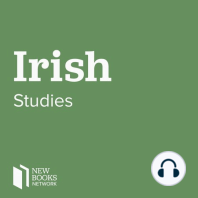69 min listen

Mary M. Burke, "Race, Politics, and Irish America: A Gothic History" (Oxford UP, 2023)
Mary M. Burke, "Race, Politics, and Irish America: A Gothic History" (Oxford UP, 2023)
ratings:
Length:
44 minutes
Released:
Dec 26, 2022
Format:
Podcast episode
Description
In this interview, she discusses her book, Race, Politics, and Irish America: A Gothic History (Oxford UP, 2023), which inserts successive Irish-American identities--forcibly transported Irish, Scots-Irish, and post-Famine Irish--into American histories and representations of race.
Figures from the Scots-Irish Andrew Jackson to the Caribbean-Irish Rihanna, as well as literature, film, caricature, and beauty discourse, convey how the Irish racially transformed multiple times: in the slave-holding Caribbean, on America's frontiers and antebellum plantations, and along its eastern seaboard. This cultural history of race and centuries of Irishness in the Americas examines the forcibly transported Irish, the eighteenth-century Presbyterian Ulster-Scots, and post-1845 Famine immigrants. Their racial transformations are indicated by the designations they acquired in the Americas: 'Redlegs,' 'Scots-Irish,' and 'black Irish.' In literature by Fitzgerald, O'Neill, Mitchell, Glasgow, and Yerby (an African-American author of Scots-Irish heritage), the Irish are both colluders and victims within America's racial structure. Depictions range from Irish encounters with Native and African Americans to competition within America's immigrant hierarchy between 'Saxon' Scots-Irish and 'Celtic' Irish Catholic. Irish-connected presidents feature, but attention to queer and multiracial authors, public women, beauty professionals, and performers complicates the 'Irish whitening' narrative. Thus, 'Irish Princess' Grace Kelly's globally-broadcast ascent to royalty paves the way for 'America's royals,' the Kennedys. The presidencies of the Scots-Irish Jackson and Catholic-Irish Kennedy signalled their respective cohorts' assimilation. Since Gothic literature particularly expresses the complicity that attaining power ('whiteness') entails, subgenres named 'Scots-Irish Gothic' and 'Kennedy Gothic' are identified: in Gothic by Brown, Poe, James, Faulkner, and Welty, the violence of the colonial Irish motherland is visited upon marginalized Americans, including, sometimes, other Irish groupings. History is Gothic in Irish-American narrative because the undead Irish past replays within America's contexts of race.
Aidan Beatty is a historian at the Frederick Honors College of the University of Pittsburgh
Learn more about your ad choices. Visit megaphone.fm/adchoices
Figures from the Scots-Irish Andrew Jackson to the Caribbean-Irish Rihanna, as well as literature, film, caricature, and beauty discourse, convey how the Irish racially transformed multiple times: in the slave-holding Caribbean, on America's frontiers and antebellum plantations, and along its eastern seaboard. This cultural history of race and centuries of Irishness in the Americas examines the forcibly transported Irish, the eighteenth-century Presbyterian Ulster-Scots, and post-1845 Famine immigrants. Their racial transformations are indicated by the designations they acquired in the Americas: 'Redlegs,' 'Scots-Irish,' and 'black Irish.' In literature by Fitzgerald, O'Neill, Mitchell, Glasgow, and Yerby (an African-American author of Scots-Irish heritage), the Irish are both colluders and victims within America's racial structure. Depictions range from Irish encounters with Native and African Americans to competition within America's immigrant hierarchy between 'Saxon' Scots-Irish and 'Celtic' Irish Catholic. Irish-connected presidents feature, but attention to queer and multiracial authors, public women, beauty professionals, and performers complicates the 'Irish whitening' narrative. Thus, 'Irish Princess' Grace Kelly's globally-broadcast ascent to royalty paves the way for 'America's royals,' the Kennedys. The presidencies of the Scots-Irish Jackson and Catholic-Irish Kennedy signalled their respective cohorts' assimilation. Since Gothic literature particularly expresses the complicity that attaining power ('whiteness') entails, subgenres named 'Scots-Irish Gothic' and 'Kennedy Gothic' are identified: in Gothic by Brown, Poe, James, Faulkner, and Welty, the violence of the colonial Irish motherland is visited upon marginalized Americans, including, sometimes, other Irish groupings. History is Gothic in Irish-American narrative because the undead Irish past replays within America's contexts of race.
Aidan Beatty is a historian at the Frederick Honors College of the University of Pittsburgh
Learn more about your ad choices. Visit megaphone.fm/adchoices
Released:
Dec 26, 2022
Format:
Podcast episode
Titles in the series (100)
Fearghal McGarry, “The Rising: Ireland, Easter 1916” (Oxford UP, 2010): Sometimes when you win you lose. That’s called a Pyrrhic victory. But sometimes when you lose you win. We don’t have a name for that (at least as far as I know). But we might call it an “Easter Rising victory” after the Irish Republican revolt of 1916.... by New Books in Irish Studies